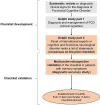Development of a diagnostic checklist to identify functional cognitive disorder versus other neurocognitive disorders
- PMID: 40034653
- PMCID: PMC11873336
- DOI: 10.1136/bmjno-2024-000918
Development of a diagnostic checklist to identify functional cognitive disorder versus other neurocognitive disorders
Abstract
Background: Functional cognitive disorder (FCD) poses a diagnostic challenge due to its resemblance to other neurocognitive disorders and limited biomarker accuracy. We aimed to develop a new diagnostic checklist to identify FCD versus other neurocognitive disorders.
Methods: The clinical checklist was developed through mixed methods: (1) a literature review, (2) a three-round Delphi study with 45 clinicians from 12 countries and (3) a pilot discriminative accuracy study in consecutive patients attending seven memory services across the UK. Items gathering consensus were incorporated into a pilot checklist. Item redundancy was evaluated with phi coefficients. A briefer checklist was produced by removing items with >10% missing data. Internal validity was tested using Cronbach's alpha. Optimal cut-off scores were determined using receiver operating characteristic curve analysis.
Results: A full 11-item checklist and a 7-item briefer checklist were produced. Overall, 239 patients (143 FCD, 96 non-FCD diagnoses) were included. The checklist scores were significantly different across subgroups (FCD and other neurocognitive disorders) (F(2, 236)=313.3, p<0.001). The area under the curve was excellent for both the full checklist (0.97, 95% CI 0.95 to 0.99) and its brief version (0.96, 95% CI 0.93 to 0.98). Optimal cut-off scores corresponded to a specificity of 97% and positive predictive value of 91% for identifying FCD. Both versions showed good internal validity (>0.80).
Conclusions: This pilot study shows that a brief clinical checklist may serve as a quick complementary tool to differentiate patients with neurodegeneration from those with FCD. Prospective blind large-scale validation in diverse populations is warranted.Cite Now.
Keywords: ALZHEIMER'S DISEASE; COGNITION; DEMENTIA.
Copyright © Author(s) (or their employer(s)) 2025. Re-use permitted under CC BY-NC. No commercial re-use. See rights and permissions. Published by BMJ Group.
Conflict of interest statement
LM receives funding from the Scottish Government Chief Scientist Office. LM provides independent medical testimony in court cases regarding patients with functional disorders, is secretary of the British Neuropsychiatry Association, and receives research funding from the Scottish Government Chief Scientist Office. JSch reports personal fees from UptoDate, outside the submitted work, runs a self-help website for patients with functional neurological symptoms (www. neurosymptoms.org) which is free and has no advertising, provides independent medical testimony in personal injury and negligence cases regarding patients with functional disorders and is secretary of the International Functional Neurological Disorder Society. He is a Chief Scientists Office NHS Research Scotland Career Researcher. AC is a director of a limited personal services company that provides independent medical testimony in court cases on a range of neuropsychiatric topics on a 50% pursuer 50% defender basis, a paid associate editor of the Journal of Neurology Neurosurgery and Psychiatry, and unpaid president elect of the International Functional Neurological Disorder Society. DP has received honoraria for continuing medical education lectures in FND; royalties from Springer for a functional movement disorder textbook and honoraria from Elsevier for a functional neurological disorder textbook; is on the editorial boards of Brain and Behavior (paid), Epilepsy.
Figures



References
LinkOut - more resources
Full Text Sources
Miscellaneous
